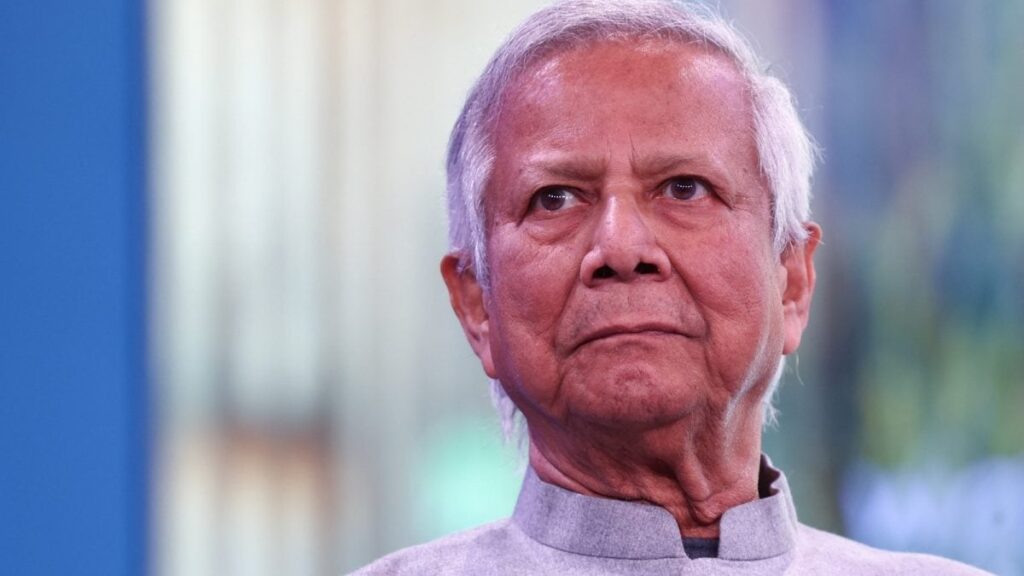Last Updated:
Bangladesh’s economic collapse can set the region in turmoil. To top it, Yunus and his student advisers have facilitated growing jihadism and Islamist takeover of institutions

If Yunus and his current team continue in power, Bangladesh could slide into civil war with the right (or rather, wrong) kind of push. (Reuters File)
In about 10 days, Muhammad Yunus’s caretaker government will complete 10 disastrous months in power with nothing to show for it. Bangladesh’s democracy has been suspended, the economy in collapse, and law and order on indefinite leave since mobs ousted Sheikh Hasina and celebrated it by waving their 76-year-old Prime Minister’s bra.
Highlights of the Yunus government’s tenure so far have been unleashing waves of genocidal terror against political opponents, setting free from prison several terrorists including Ansarullah Bangla Team chief Muhammad Jasimuddin Rahmani, giving Islamist groups like Jamaat, Hefazat, and Khelafat free play, allowing proscribed outfit Hizbut Tahrir’s first public rally in Dhaka, making up ad hoc laws to stay in power, and bringing the economy to the point of breakdown.
At a press conference on Sunday, top industrialists said Bangladesh’s economy was a ticking time bomb. The business leaders accused the interim government of sleeping through leaping production costs, fuel shortages, and a hostile business environment. They warned that the power and gas crisis is wrecking local industries and leading to factory shutdowns, mass layoffs, and financial defaults.
Bangladesh Textiles Mills Association President Showkat Aziz Russell said if during the 1971 Liberation War intellectuals were targeted, in 2025 it is the entrepreneurs.
“We are paying gas bills but getting no supply. Factories are idle, yet we are pressured to repay loans, deal with soaring interest rates, and face government threats,” Dhaka Tribune quoted him as saying.
Bangladesh’s economic collapse — given its massive low-income workforce — is enough to set the region in turmoil. To top it, Yunus and his immature and greedy student advisers have facilitated growing jihadism and the Islamist takeover of institution after institution.
If Yunus and his current team continue in power, Bangladesh could slide into civil war with the right (or rather, wrong) kind of push.
Their current dispensation is solely interested in hanging on unelected for as long as possible and making appalling amounts of money while Bangladesh goes to the dogs. Moazzem Hossain, the former assistant personal secretary (APS) of Asif Mahmud Shojib Bhuyain, is accused of amassing ill-gotten wealth of over 300 crore taka in such a short time. Many believe it is Asif’s money, that too just a fraction of what the ‘student adviser’ has swiftly laundered.
This lot has resorted to emotionally blackmailing the nation that they were the harbingers of Liberation 2.0, so they should be allowed to rule without an electoral mandate.
Not just that, they want to carry out ‘sanskar’ or reforms of everything from the electoral process to education, a job which only an elected government must undertake.
BNP, the party projected to win handsomely if elections are held now, has taken to the streets demanding elections. Its exiled leader Tarique Rahman slammed the Yunus government from London for the state of the economy and law and order. If the BNP intensifies its agitation, the Yunus government will not be able to withstand it.
The Yunus government, run from the shadows by Jamaat and other Islamists, also want to permanently ban the Awami League from Bangladesh politics. It has already outlawed AL’s activities. If the Awami League is barred from contesting, it will fulfil Pakistani ISI or the Muslim Brotherhood’s dream of subverting for good Bangladesh’s spirit of Bengali nationalism which AL captures at least on paper, and usurping it by an Islamic caliphate in the garb of exclusionary democracy.
But what stands between Bangladesh and the abyss is its army. Bangladesh army chief Waker-uz-Zaman wants Chief Adviser Muhammad Yunus gone and elections held as soon as possible. The army, as well as the BNP, have cautioned Yunus not to get on to a misadventure like opening the Chittagong corridor for the UN and pushing his own nation and the region into chaos, only to do the US Deep State’s bidding.
The Yunus regime tacitly tried to engineer a coup in the army to topple General Waker, but all the service chiefs and the forces stand firmly with him today. Waker is against Yunus’s idea of waiting until June for elections, a ploy to buy time.
The interim government’s legal basis is dubious. Article 123 of Bangladesh’s Constitution mandates elections within 90 days of a government’s dissolution, whatever the reason may be. Using it, the army may instruct President Mohammed Shahabuddin to declare a state of emergency.
During an emergency, the President could dissolve the interim government and declare immediate elections. Under Article 141A of the Bangladesh Constitution, the President can take on emergency powers if the constitutional machinery breaks down.
Given Yunus and his advisers’ wilful dithering, that could be the only logical option left. Each day Yunus and his band of boys who suffer from premature articulation are in power, peace in the region will be taking a few big steps away.
Abhijit Majumder is a senior journalist. Views expressed in the above piece are personal and solely those of the author. They do not necessarily reflect News18’s views.
- First Published:

